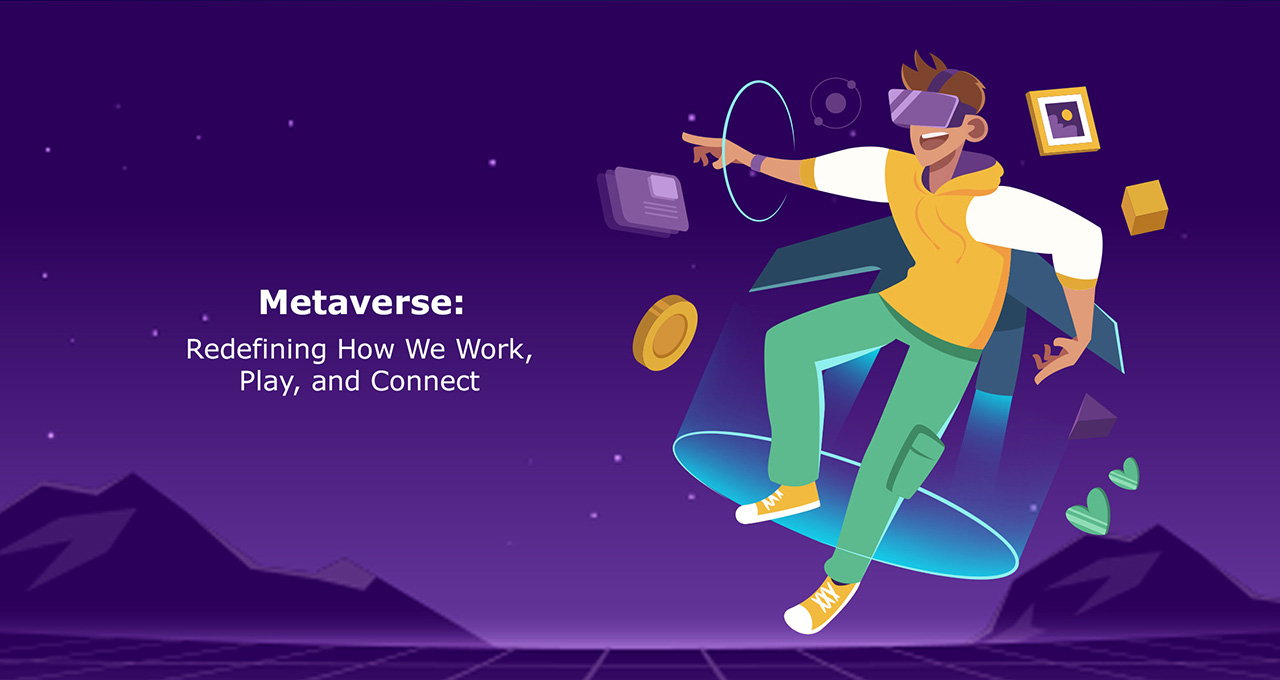
Image Credit: Image by Freepik
In recent years, the concept of the Metaverse has captured the imagination of millions worldwide. This emerging digital frontier has the potential to redefine industries and transform the way we live, work, and play. In this article, we will explore the rise of the Metaverse, its potential applications across various industries, and how it is revolutionizing our lives. Get ready to dive into a world where virtual and physical realities intertwine, creating immersive and interconnected experiences like never before.
Defining the Metaverse
The Metaverse can be described as a collective virtual shared space that encompasses a vast interconnected network of virtual and physical spaces. It goes beyond the confines of traditional virtual worlds, blurring the boundaries between the physical and the virtual. This convergence of augmented reality (AR), virtual reality (VR), and the internet creates an immersive and interactive environment where individuals can engage with each other and digital entities in real-time. The Metaverse is driven by advanced technologies such as VR, AR, 5G, cloud computing, artificial intelligence (AI), and blockchain.
Advancements in the Metaverse
The Metaverse is constantly evolving, driven by advancements in technology and the growing demand for immersive digital experiences. One of the key advancements in the Metaverse is the development of virtual reality (VR) and augmented reality (AR) technologies. VR immerses users in a completely virtual environment, while AR overlays digital information onto the real world. These technologies enhance the level of immersion and interactivity in the Metaverse, allowing users to seamlessly interact with digital content and virtual objects.
Another significant advancement in the Metaverse is the integration of artificial intelligence (AI). AI-powered algorithms and systems enable more realistic and intelligent interactions within the virtual environment. AI can generate lifelike avatars, respond to user inputs, and analyze vast amounts of data to personalize and enhance the user experience. Chatbots and virtual assistants powered by AI can provide real-time assistance and support in the Metaverse, creating a more seamless and immersive experience for users.
Blockchain technology is also playing a crucial role in the development of the Metaverse. Blockchain provides a decentralized and secure infrastructure for storing, verifying, and exchanging digital assets within the Metaverse. It allows for the creation and trading of non-fungible tokens (NFTs), which represent unique digital assets such as virtual land, artwork, and collectibles. Blockchain ensures transparency, traceability, and ownership rights in the Metaverse, enabling users to securely buy, sell, and trade virtual assets.
Applications of the Metaverse
The Metaverse has a wide range of applications across various industries. Let’s explore some of the key areas where the Metaverse is making an impact:
Gaming and Entertainment
The gaming industry is at the forefront of Metaverse development, with virtual worlds and immersive experiences becoming increasingly popular. In the Metaverse, gamers can explore vast virtual landscapes, interact with other players in real-time, and customize their virtual identities. Virtual reality (VR) and augmented reality (AR) technologies enhance the level of immersion and interactivity, creating a more realistic and engaging gaming experience. The Metaverse also extends to the entertainment industry, where virtual concerts, events, and performances can be experienced by millions simultaneously, transcending geographical boundaries.
Education and Learning
The Metaverse has the potential to transform education and learning by providing immersive and interactive experiences. Students can explore historical events, visit virtual museums, and participate in virtual experiments and simulations. The Metaverse enables collaborative learning, allowing students from different parts of the world to work together on projects and share knowledge. Virtual reality (VR) and augmented reality (AR) technologies enhance the learning experience by providing a more engaging and interactive environment. The Metaverse makes education more accessible, allowing learners to access educational resources and courses from anywhere in the world.
Business and Collaboration
The Metaverse offers new opportunities for businesses to connect with customers, collaborate with partners, and innovate in a virtual environment. Companies can establish virtual headquarters, host virtual conferences, and create virtual showrooms to showcase their products and services. The Metaverse enables global collaboration, allowing teams to work together regardless of physical location. Virtual reality (VR) and augmented reality (AR) technologies facilitate virtual meetings, presentations, and training sessions, providing a more immersive and interactive experience. The Metaverse also opens up new business models, such as virtual marketplaces and digital asset trading.
Social Networking and Communication
Social interactions are a central aspect of the Metaverse, enabling people to connect, communicate, and form communities in virtual spaces. Virtual reality (VR) and augmented reality (AR) technologies enhance the social networking experience by providing more realistic and immersive interactions. Users can create avatars, customize their virtual identities, and meet and interact with other users in virtual environments. The Metaverse transcends geographical boundaries, allowing individuals from different parts of the world to connect and share experiences. It fosters a sense of global interconnectedness and enables new forms of social interaction and collaboration.
E-commerce and Retail
The Metaverse has the potential to transform the e-commerce and retail industry by providing immersive and personalized shopping experiences. Virtual reality (VR) and augmented reality (AR) technologies enable users to try on virtual outfits, visualize products in their own space, and interact with virtual sales assistants. The Metaverse enhances the online shopping experience by addressing the limitations of traditional e-commerce, such as the inability to physically touch and try on products. Virtual marketplaces and digital asset trading platforms within the Metaverse enable users to buy, sell, and trade virtual assets and collectibles.
Healthcare and Medicine
The Metaverse has promising applications in the healthcare and medicine industry. Virtual reality (VR) and augmented reality (AR) technologies can be used for medical training, patient education, and surgical simulations. Medical professionals can practice procedures in a virtual environment, enhancing their skills and reducing the risk to patients. The Metaverse enables remote healthcare consultations, allowing patients to connect with doctors and specialists from anywhere in the world. Virtual reality (VR) can also be used for pain management and rehabilitation, providing immersive and interactive experiences for patients.
Challenges and Considerations
While the Metaverse presents exciting opportunities, there are challenges and considerations that need to be addressed. Privacy and security are major concerns in the Metaverse, as users interact with and share personal information in virtual environments. Ensuring data protection and user privacy will be crucial in building trust and confidence in the Metaverse. Accessibility and inclusivity are also important considerations, as the Metaverse should be accessible to users of all abilities and backgrounds. Interoperability and open standards are key to prevent fragmentation and promote a seamless user experience across different platforms and technologies.
Conclusion
The Metaverse is reshaping how we work, play, and connect in the digital age. It offers immersive and interconnected experiences that blur the boundaries between the physical and the virtual. From gaming and entertainment to education, business, and social interactions, the Metaverse has the potential to revolutionize various industries.
Advancements in virtual reality (VR), augmented reality (AR), artificial intelligence (AI), and blockchain technology are driving the development of the Metaverse. However, challenges such as privacy, security, accessibility, and interoperability need to be addressed to ensure the success and widespread adoption of the Metaverse.
As we embark on this exciting journey, collaboration between technology companies, content creators, and users will be key in shaping the future of the Metaverse. Let us embrace this transformative concept and explore the endless possibilities it offers to reshape our world.
At GoPhygital, we specialize in creating metaverse solutions that meet your specific requirements. Let us help you bring your idea to life. You can reach out to us here.

